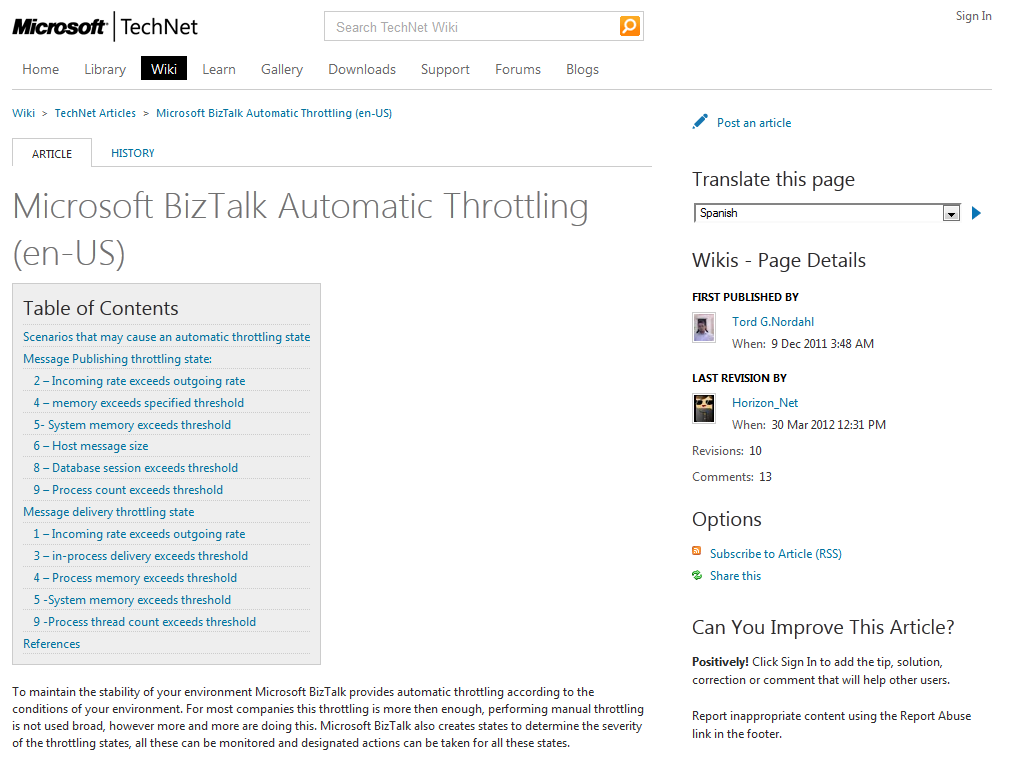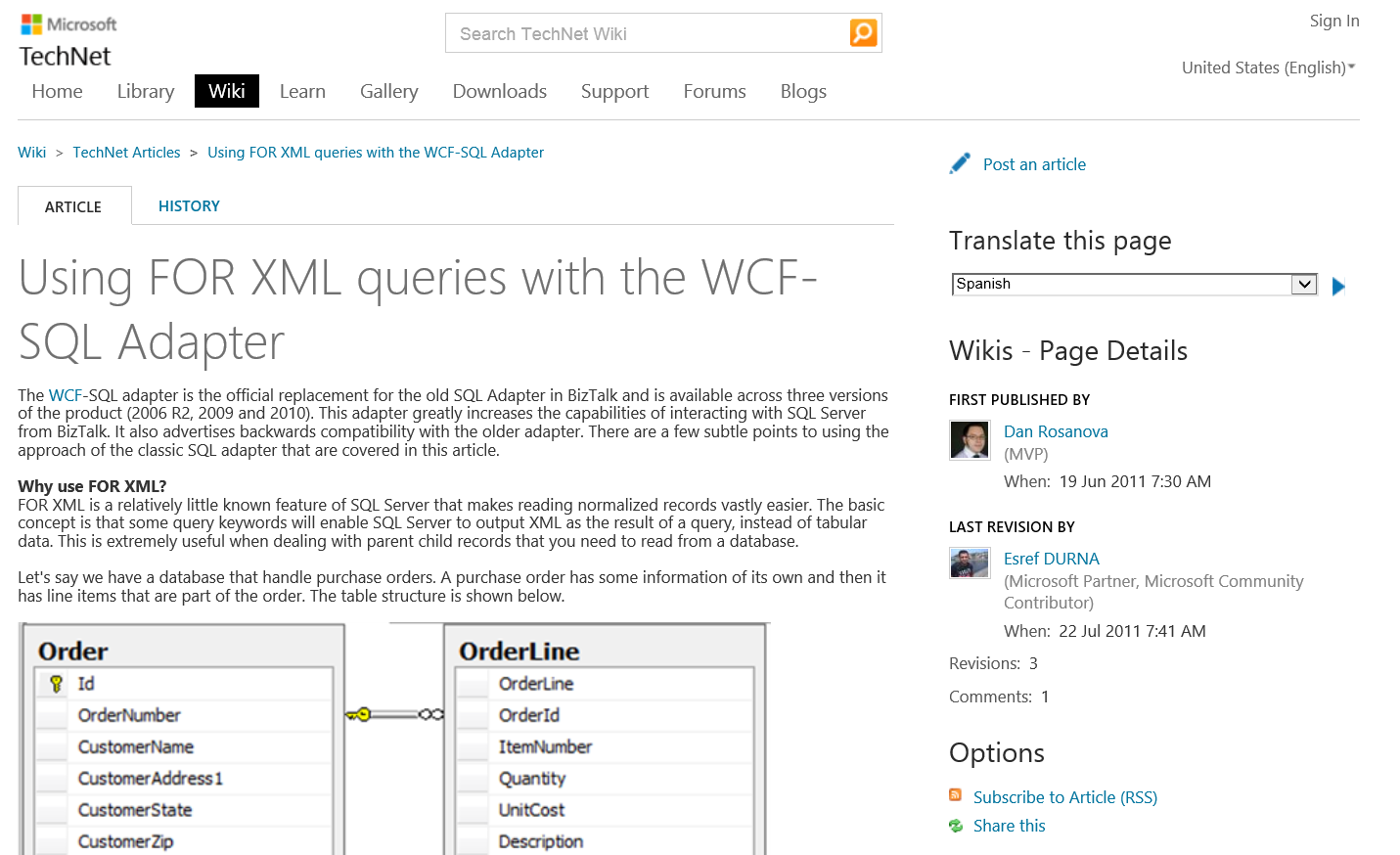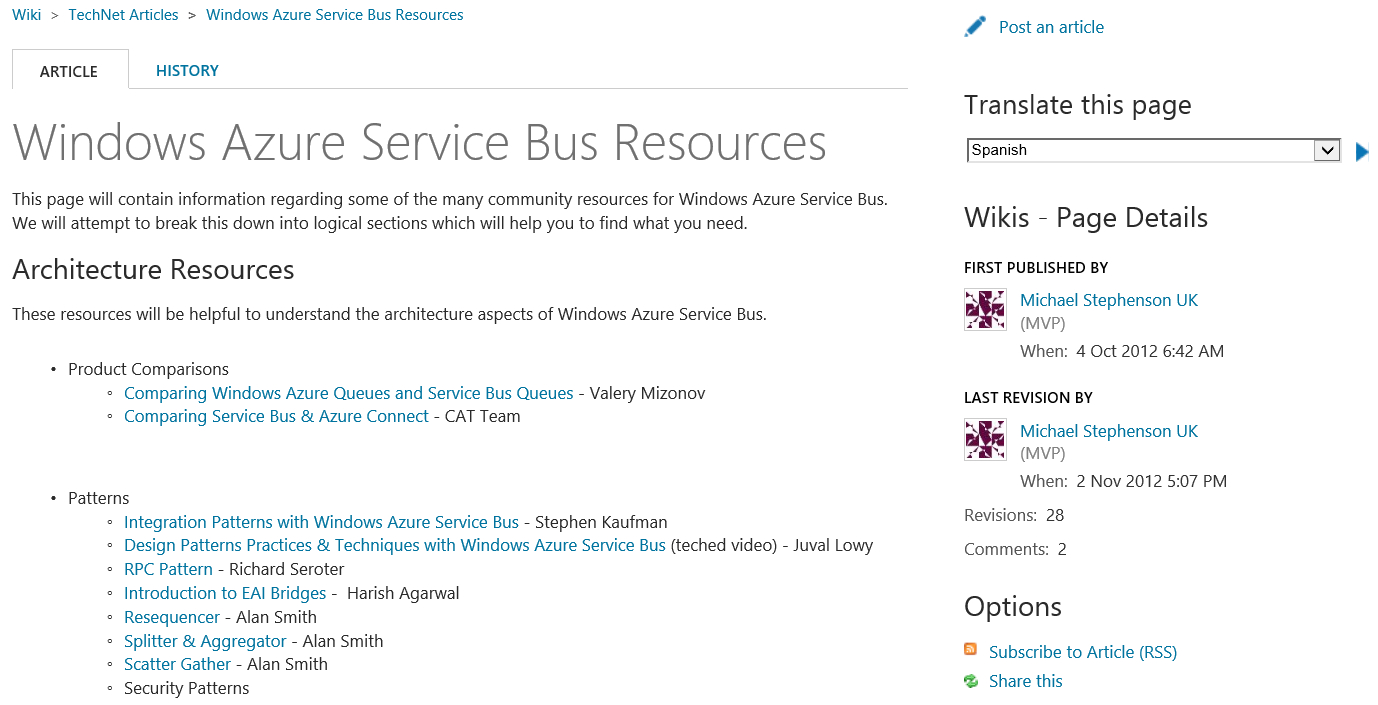Interviewed Wiki Ninjas - The BizTalk Wiki Ninja Clan!!!
Hello! Welcome to another Monday! You know what that means, right? It means interviews with Wiki Ninjas!
For today's blog post, I'm compiling our BizTalk Wiki Ninjas!
First, who are they?
Microsoft BizTalk Wiki Ninjas
I have worked at Microsoft since 1999. Until recently, most of that time has been spent supporting IIS and BizTalk users. Now, I am a Technical Writer for BizTalk and Windows Azure BizTalk. For her full interview, see Interview with a Wiki Ninja: Mandi Ohlinger.
My favorite quote from Mandi, but I'm not sure what to think of it yet... "[TechNet Wiki is] like MSDN on performance-enhancing drugs." - Mandi Ohlinger
Nitin's MSDN Blog. For his full interview, see Interview with a Wiki Ninja: Nitin Mehrotra - Microsoft BizTalk Server and BizTalk Services Senior Writer.
BizTalk MVP Wiki Ninjas
Steef-Jan Wiggers has almost 15 years experience as a technical lead developer, application architect and consultant, specializing in custom applications, enterprise application integration (BizTalk), Web services and Windows Azure. For his full interview, see Interview with a BizTalk MVP Wiki Ninja!!! - Steef-Jan Wiggers.
I'm an outgoing norwegian with a passion for Microsoft BizTalk and a Microsoft Integration MVP. I'm a big fan of the benefits you get when sharing in a community. I use the forums to ask and answer questions, and the wiki to upload scenarios or other articles. For his full interview, see Interview with a BizTalk Advisor Wiki Ninja!!! - Tord G. Nordahl.
Sandro Pereira lives in Portugal and works as a BizTalk consultant at DevScope (https://www.devscope.net). In the last few years he has been working on implementing integration scenarios and Cloud Provisioning at a major telecommunications service provider in Portugal. For his full interview, see Interview with a BizTalk MVP Wiki Ninja!!! - Sandro Pereira.
Four time BizTalk (now Integration) MVP and author of BizTalk Server 2010 Patterns (https://www.packtpub.com/microsoft-biztalk-server-2010-patterns/book)! I'm a software architect with fourteen years experience delivering Microsoft solutions. For his full interview, see Interview with a Microsoft Integration MVP: Dan Rosanova.
Michael is a Microsoft Integration MVP from the United Kingdom. For his full interview, see Interview with a Microsoft Integration MVP: Michael Stephenson.
Now let's get to the questions!
Who are you, where are you, and what do you do? What are your specialty technologies?
Steef-Jan: I'm an Architect at Ordina ICT in the Netherlands. Ordina is a specialist knowledge provider in the Benelux (Belgium, The Netherlands, and Luxemburg) and predominatly active in the public, financial, and industrial sector. My job involves working with customers on integration solutions with Microsoft Technology like .NET (WCF), SQL, and BizTalk Server. I architect, design solutions, perform audits, guide installation and configurations of BizTalk environments, and consultancy. Within the Business Unit Application Integration and Middleware (AIM), I lead a group of around eight professionals regarding knowledge management and am responsible for sharing knowledge, exchanging experiences, planning meetings, and facilitating courses. Besides knowledge management I am also managing the Line-Of-Business (LoB) BizTalk for Ordina Microsoft Solutions in the Netherlands to create/maintain the LoB year plan, coordinate contacts with BizTalk community (BTUG) in the Netherlands and Sweden, and partnership with Microsoft for BizTalk.
Tord: I'm Tord Glad Nordahl, a young guy from Bergen, Norway. I am married and have a little girl (soon father of two). I'm currently working for Bouvet as a BizTalk advisor. My job gives me the opportunity to travel the world and explore the divers capabilities of BizTalk at all kinds of different companies. By doing this I gain a lot of experience and knowledge. That is not all as I also get the chance to do presentations. This month I'm heading to London to do a presentation for the BizTalk user group. In May I'm heading to Italy together with MVP's Steef-Jan Wiggers, Sandro Pereira, Saravana Kumar, and BizTalk community member Lex Hegt. The BizTalk MVP Niño Crudele will host an event, where we all will do some presentations. I will be talking about host thresholds and automatic throttling. (I love traveling and speaking).
Sandro: I’m 33 years old, I live in the beautiful region of Porto in Portugal and from a very early age I got a passion for technology and especially for computers, I still remember with some nostalgia the days of my Timex, Commodore Amiga and Pascal. I started my professional career as a Java, C++ and C# developer and then as a Web project manager. In 2005 I decided to accept a new challenge and joined DevScope as BizTalk consultant and currently also as BizTalk Project Manager. DevScope is a company specializing in business intelligence solutions, systems integration, CRM and collaborative portals based on Microsoft technology and predominantly active in the industrial, financial and public sector.
Dan Rosanova: I’m a senior architect in the Technology Integration practice at West Monroe Partners, an international, full-service business and technology consulting firm. I’m also a three time MVP and author of Microsoft BizTalk 2010 Patterns. I’ve been developing on Microsoft platforms since the late 90s and have a heavy focus on distributed computing.
Michael Stephenson: I am from Newcastle in the UK and work for Connected Systems Consulting Ltd, which is my small freelance consultancy specializing in integration projects using Microsoft (and associated) technologies. I have been a Microsoft BizTalk MVP for a number of years and more recently have moved to the new Microsoft Integration MVP encompassing BizTalk and other Microsoft Integration technologies. I'm also part of the Microsoft Advisors program for Connected Technologies and Windows Azure.
Nitin: I am a Senior Writer in the STB – CSI organization. I work from the Redmond campus and my major focus areas now are BizTalk Server and BizTalk Services. I also help double-up as a Lead Writer for both these products and work on planning all the content deliverables that we ship for these two products.
Mandi: Technically, I’m a writer for BizTalk Server, Service Bus EAI & EDI Labs, and BizTalk Server on the VM Role. In my heart, I am a BizTalk support engineer. Prior to the Writer role, my entire Microsoft career has been in support. I started with Microsoft Access where I spoke with a spectrum of customers, including teaching the meaning of ‘double-click’, explaining relational database concepts, writing T-SQL queries, and helping with VBA code. Next, it was supporting IIS users that I found I LOVED debugging memory dumps. Yep – LOVED. After that, it was BizTalk support where I remained for what seems like a lifetime. And BizTalk is where I’ve stayed. I cannot think of another product that touches so many other technologies and layers. From a support perspective, BizTalk is perfect because every day is a chance to learn something new.
What are your favorite articles you’ve contributed?
Steef-Jan: My favorite article I very much enjoyed writing is BizTalk Server 2010 (https://social.technet.microsoft.com/wiki/contents/articles/biztalk-server-2010.aspx), because the latest Wiki articles only gave details about BizTalk 2009, and I felt an update would be nice. Another article I liked doing was BizTalk Server 2010 – Tools (https://social.technet.microsoft.com/wiki/contents/articles/5208.aspx). It describes and lists all the tools available for BizTalk 2010 to enable benchmarking, performing health checks, and to document BizTalk environments, aid in troubleshooting, testing, and deploying BizTalk solutions, and so on.
Tord: My favorite articles must be the article about Automatic throttling, this is a resources many have asked for and is hot in the community, in addition to this are the host thresholds as they both walk hand-in-hand. The last thing I wanted to add was the Performance Counters for BizTalk. But I must say many of my articles are my favorites, basically because I use and reference them very often.
Dan Rosanova: I think that would be Using FOR XML queries with the WCF-SQL Adapter . I’ve been working with XML since 1999 and it’s something I’ve really come to like using (granted it did take me a few years to actually like it). Once you know the right tools to use for working with XML it’s really pretty powerful. Things like the XmlSerializer made working with XML in .NET far simpler. I’ve also done a lot of SQL Server work and SQL Server started supporting FOR XML in the 2000 version. This is a really powerful tool because it enabled you to do two important things: 1) return table relational queries in a hierarchy rather than a flat table and 2) auto-serialize these into .NET objects. I used this pattern a lot (sometimes with XSLT for translation or presentation if skipping the .NET part).
Michael Stephenson: Windows Azure Service Bus Resources This resource pulled together a lot of the community content we had used in a simple to use page rather than spending hours searching for things.
Nitin: One of my favorite articles is Invoke ReSTful Web Services with BizTalk Server 2010. This articles is a great example of community-driven content, end to end. The idea/request for this article came from the BizTalk Server community. I wanted to write about something that the customers wanted to see and what they thought was missing. I asked this question to the community through my blog/forum and BizTalk Server + REST was the top request. So, that’s where it started. After that, people from the community sent me whatever little they had done around BizTalk Server + REST so I didn’t have to do all the groundwork. I already had a start. Then once the content was ready, I published it to the Wiki for others to contribute/improve the content and shape it the way they like. So, that was a really great experience.
Mandi: BizTalk Administrator's Checklist Compiled by Microsoft BizTalk Support is definitely on the list. During a support call, a MsgBox Viewer report is typically always collected. I always review this report and make suggestions. Over time, this list started to create itself. It includes actual support calls we’ve received, like knowing the SSO master secret password. There isn’t anything worse than telling a customer BizTalk has to be unconfigured/reconfigured because no one knows the SSO master secret password.
What is it about TechNet Wiki that interests you?
Steef-Jan: What got me interested in TechNet Wiki was my wife. She works at Bioengineer, and they created an internal wiki. I saw her devotion to creating wiki pages, and I felt like I want to try that too. I noticed that Microsoft offered TechNet Wiki with similar capabilities as the wiki platform my wife was working on. I started writing one article, and before I knew it, I started the next one. I am happy Microsoft offers a way to contribute information, knowledge, and experience through Wiki and by enhancing its own MSDN Library.
Nitin: One of the biggest benefits from the Wiki is nurturing and improving the content. The other big one is people interaction and just like other community-driven forums, it helps put faces to names, albeit with a difference. During a recent customer summit, I ran into individuals who had either contributed to or commented on my Wiki articles. Even though you would be meeting them for the first time, you strike an instant rapport just because you had interacted earlier. These are important contacts to be nurtured because in true sense, that’s how the community grows stronger, and the Wiki helps us in doing that.
Mandi: Does all of it count? I like that anyone can add to existing articles. I like that it’s easy to use. I like the feeling of ‘community’ when someone comments or adds to an article. I remember the day I first heard of the TechNet Wiki idea. My colleague, Larry Franks, came to the BizTalk support aisle here in Charlotte and asked about using a Wiki for content. My reply was “What a good idea!” There is a lot of knowledge and experience in the community. The TechNet Wiki provides a central location to share this knowledge. And, it’s for anyone. You can post information or browse for information. It’s like MSDN on performance-enhancing drugs.
Do you have any tips for new Wiki contributors?
Steef-Jan: Writing Wiki articles is fun, and there are already many articles out there, but there is room for a lot more. New contributors can view featured articles to have a look and feel of how these have become great articles. I also recommend that newcomers write about what drives/motivates them when using a particular Microsoft technology or product; share your experience and knowledge about it, something that you found out that's useful, a best practice, a different approach in implementation, and so on.
Tord: Yes I do, there’s nothing you can do wrong, and there is nothing that’s not good enough. If you have a plan commit to it, and get it out there! Ask for help if you’re stuck and enjoy it! And remember sharing is knowledge!
Dan: Start off as a consumer – this Wiki is a great resource. And comment on other people’s articles. If there are things you read that aren’t clear comment on them or modify them. Try to help other make their knowledge clear and easy to consume. Then next time you find something out or solve a problem that you think is really cool or that you’ve run into many times before check the Wiki. If it’s not already there take the time and write it up. The great thing about the Wiki is that the community will help you polish it so you don’t need to be afraid or feel pressure to make it perfect on your first draft. Just be sure to contribute useful things.
Michael: A couple of tips I would suggest for new contributors would be firstly to use the comments section. It's always good to have a discussion associated with an article you have written and it’s a good way to enhance the articles with other experiences. You will also become familiar with others who are active in the community. A second tip would be to ask other authors. In my experience most people in the community are very friendly and happy to engage. I'm sure if you wanted someone to give you feedback before you published your article a lot of people would be happy to help.
You can go check out the individual interviews and drop them a note!
- Interview with a Wiki Ninja: Mandi Ohlinger
- Interview with a Wiki Ninja: Nitin Mehrotra - Microsoft BizTalk Server and BizTalk Services Senior Writer
- Interview with a BizTalk MVP Wiki Ninja!!! - Steef-Jan Wiggers
- Interview with a BizTalk Advisor Wiki Ninja!!! - Tord G. Nordahl
- Interview with a BizTalk MVP Wiki Ninja!!! - Sandro Pereira
- Interview with a Microsoft Integration MVP: Dan Rosanova
- Interview with a Microsoft Integration MVP: Michael Stephenson
Jump on in. The Wiki is fine.
- Ninja Ed




